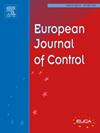基于转置自适应滤波的非线性多元系统数据驱动迭代学习控制
IF 2.6
3区 计算机科学
Q2 AUTOMATION & CONTROL SYSTEMS
引用次数: 0
摘要
针对稳定多变量非线性动力系统,提出了一种新的数据驱动迭代学习控制算法。该算法结合了两种数据驱动的学习机制:一种自适应前馈算法,该算法将扰动动力学建模为未知的线性时变系统,并将相对于LTI参考模型的均方根误差最小化,其次是第二种学习机制,用于轨迹跟踪的快速收敛。对于多变量系统,系统级联的非交换性质要求使用右逆进行自适应模型匹配以促进误差收敛。为了解决自适应滤波中的挑战,引入了一种基于换位的技术来获得方形和过度驱动系统的正确逆。对于无输入无输出系统,该方法需要进行ni×no实验。提出了一种通过重组脉冲响应矩阵分量来降低这一要求的有效算法。通过仿真和实验验证了所提方法的有效性。本文章由计算机程序翻译,如有差异,请以英文原文为准。
Data-driven iterative learning control for nonlinear multivariate systems using transpose adaptive filtering
This paper presents a novel data-driven iterative learning control (ILC) algorithm for stabilized multivariable nonlinear dynamical systems. The proposed algorithm incorporates two data-driven learning mechanisms: an adaptive feedforward algorithm that models perturbed dynamics as an unknown linear time-varying system and minimizes RMS errors with respect to an LTI reference model, followed by a second learning mechanism for fast convergence in trajectory tracking. For multivariate systems, the non-commutative nature of the cascade of systems necessitates the use of the right inverse for adaptive model matching to promote error convergence. To address challenges in adaptive filtering, a transposition-based technique is introduced to obtain the right inverse for square and over-actuated systems. For -input--output systems, the approach necessitates conducting experiments. An efficient algorithm is proposed to reduce this requirement by reorganizing impulse response matrix components. The effectiveness of the proposed methods is demonstrated through both simulations and experiments.
求助全文
通过发布文献求助,成功后即可免费获取论文全文。
去求助
来源期刊

European Journal of Control
工程技术-自动化与控制系统
CiteScore
5.80
自引率
5.90%
发文量
131
审稿时长
1 months
期刊介绍:
The European Control Association (EUCA) has among its objectives to promote the development of the discipline. Apart from the European Control Conferences, the European Journal of Control is the Association''s main channel for the dissemination of important contributions in the field.
The aim of the Journal is to publish high quality papers on the theory and practice of control and systems engineering.
The scope of the Journal will be wide and cover all aspects of the discipline including methodologies, techniques and applications.
Research in control and systems engineering is necessary to develop new concepts and tools which enhance our understanding and improve our ability to design and implement high performance control systems. Submitted papers should stress the practical motivations and relevance of their results.
The design and implementation of a successful control system requires the use of a range of techniques:
Modelling
Robustness Analysis
Identification
Optimization
Control Law Design
Numerical analysis
Fault Detection, and so on.
 求助内容:
求助内容: 应助结果提醒方式:
应助结果提醒方式:


